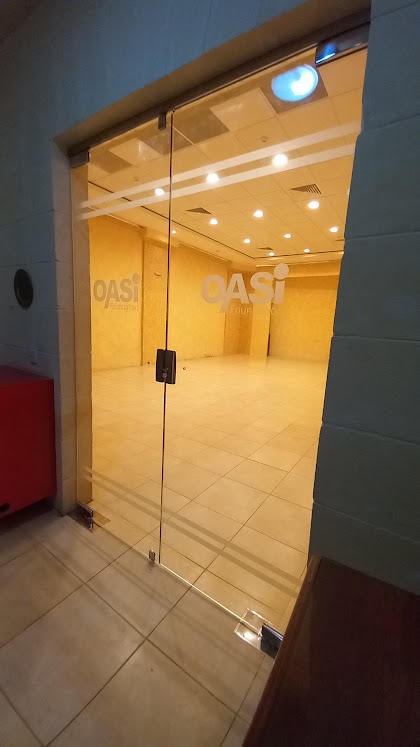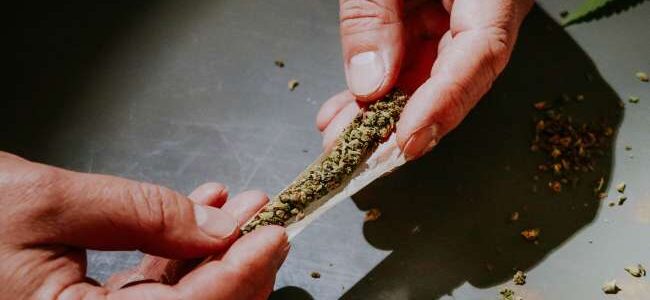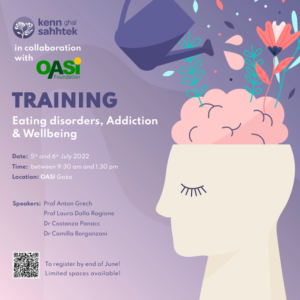Press Release - Jum l-OASI 2023
Fid-diskors għall-okkażjoni ta’ Jum l-OASI, il-Kap Eżekuttiv, is-Sur Noel Xerri, għamel referenza għall-ħidma li wetqet tal-Fondazzjoni OASI fl-2022. Huwa rrimarka li l-OASI kellha ‘l fuq minn 300 talbiet mingħand persuni li għandhom diffikultajiet ta’ addiction u ‘l fuq minn 200 persuna rċevew terapija residenzjali jew fil-komunità’. Huwa semma li 44% ġew inizjalment minħabba diffikultajiet relatati mal-kokaina u 41% minħabba problemi relatati max-xorb. Tenna’ wkoll li huwa nkwetati li kien hemm nuqqas fl-ammont ta’ nies li avviċinaw l-OASI minħabba l-problema tal-kannabis, kkomparat mas-snin ta’ qabel. Fil-fatt, matul l-2022, 6% ta’ dawk li talbu l-għajnuna kellhom problema ta’ kannabis, waqt li kien hemm 10% fl-2021 u 12% fl-2020. Il-Sur Xerri saħaq fuq l-importanza tal-motto li l-OASI dejjem ħaddnet “Il-ħajja sabiħa mingħajr droga”, u kemm dan għadu attwali. Hu semma’ it-tbatija li jgħaddu minnha il-membri tal-familja minħabba l-problema tal-addiction, fejn ta’ eżempji konkreti ta’ dan.
Onor. Dr Alex Borg reġa’ saħħaħ l-argument li għamel is-sena l-oħra għal din l-okkażjoni- l-importanza li neliminaw l-kelma ‘rikreattiv’u nsemmu biss l-użu tad-droga, għaliex biż-żmien, l-użu tad-droga jġib diversi diffikultajiet. Suġġett ieħor li ffoka fuqu l-Onor. Dr Borg kienet l-importanza tas-settur tal-prevenzjoni. Huwa għamel referenza għan-nies fis-soċjetà tagħna li ma jagħmlux użu mid-drogi u semma kif dawn il-persuni jiġu affettwati minn ċerti ideat li jġiegħluhom jiddubitaw għandhomx ikomplu bid-deċiżjoni tagħhom li joqogħdu ‘l bogħod mid-drogi, jew humiex jitilfu mill-esperjenzi li għaddejjin minnhom l-ħbieb tagħhom li jagħmlu użu mid-drogi. Huwa tkellem fuq l-importanza tal-evalwazzjoni tal-qasam tal-prevenzjoni u ssuġġerixxa li inħarsu lejn l-livelli ta’ suċċess ta’ dawn l-istrateġiji u nevalwaw hemmx affarijiet li jistgħu jinbidlu biex ikunu aktar ta’ suċċess. Huwa għalaq billi jfakkar il-ħidma mportanti u essenzjali tal-fondazzjoni OASI u ħeġġiġha sabiex tkompli fil-miġja tagħha.
‘Kemm hu sew li aħna hawn.’ Dan kien il-kliem li bih fetaħ id-diskors tiegħu c-Chairman tal-Board tad-diretturi tal-fondazzjoni, s-Sur Joe Borg. Huwa spjega minn fejn oriġina l-isem tal-Fondazzjoni OASI. L-oasi hija għall-post fejn wieħed isib l-ilma wara li jkun ilu jissielet fid-deżert u kif bl-istess mod, l-OASI tgħin lill-persuna jgħaddi mid-dlam għad-dawl. Is-Sur Borg saħaq fuq l-importanza li wieħed qatt m’għandu jaqta’ qalbu, anzi għandu ikompli jiġġieled, għax l-kuntentizza tinsab biss fir-rebħa tal-bidla. Is-Sur Borg tkellem ukoll dwar l-għan li bih twaqqfet il-Fondazzjoni 32 sena ilu- li ż-żgħażagħ jingħataw opportunità li jesperjenzaw bidla. Saħaq ukoll li għalkemm s-soċjetà’ tagħna qed tinbidel b’mod mgħaġġel, il-ġlieda tal-OASI tibqa’ l-istess, u r-rebħa ta’ kull wieħed tibqa’ l-istess. Huwa semma’ wkoll l-importanza tal-volontarjat u kemm il-ħidma li wettqu kienet impekabbli għal din l-Fondazzjoni. Huwa saħaq li din l-esperjenza hi każ ċar li juri kemm meta tagħti bla kundizzjoni, tirċievi lura verament ferm u ferm iktar.
Il-bord tad-diretturi tal-OASI flimkien mal-Kap Eżekuttiv tal-Fondazzjoni rrikonoxxew l-ħidma ta’ Dun Manuel Cordina u l-diretturi l-oħra li flimkien waqfu din l-organizzazzjoni. Huma ukoll irringrazzjaw lil dawk kollha li huma t’għajnuna f’din l-mixja bħal Knisja t’Għawdex li kienet ta’ sapport mill-bidu, lill-Ministeru tal-Politika Soċjali u l-Ministeru għal Għawdex tal- għajnuna tagħhom.
Il-poeta Dr Alfred Grech qara poeżija li pprepara għal din l-okkażjoni. Rappreżentanti mill-Caritas Malta u s-Sedqa kienu preżenti ukoll għal din iċ-ċerimonja. Għaċ-ċerimonja attenda ukoll is-Sur Anton Tabone li kien strumentali ħafna fit-twaqqif ta’ din l-organizzazzjoni.
F’dan il-jum speċjali ta’ Jum L-OASI, żewġ voluntiera li ilhom jaħdmu kontinwament għal ‘l fuq minn 20 sena ġew rikonoxxuti bi-premju ta’ ’Ġieħ l-OASI’ għall-għajnuna tagħhom. Nhar it-Tnejn 26 ta’ Ġunju l-Fondazzjoni OASi tikkommemora it-32 sena mit-twaqqif tagħha.
Press Coverage:
Diskors ta' Jum l-OASI:














































